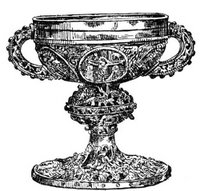
As a rather cautious researcher I did once go in pursuit of some insight into the Holy Grail, by exploring the original stories. It came as quite a surprise to find out that it might appear as a cup (either from the Last Supper or the cup that caught the blood from Jesus’ wound) or a plate/bowl/dish, or a stone (philosopher’s stone), or a cauldron, or even a bloodline (Holy Blood, Holy Grail – sang graal, and all that). The stories seem confused and confusing.
The main function of the Grail seems like a ‘motivator’ for people – setting out on a difficult quest, the grail works as the carrot (ordeals of the adventure work as the stick). You might also relate it to the crock of gold at the foot of the rainbow, or almost any other kind of enigmatic and well-hidden treasure.
It has become a weak metaphor for the elusive ideal in any particular field of endeavour (‘the holy grail of stamp collectors’) – and of course has found itself mocked and maybe trivialised in Monty Python and the Holy Grail – as well as never getting clearly defined (Cathar treasure, or Cathar secret) in books like Rat Scabies and the Holy Grail (exploring the Rennes-Le-Chateau mystery).

After some reflection, I decided that the Grail looks like little more than a Macguffin, to me. Alfred Hitchcock used this word for an object (sometimes a person or event) around which the plot revolves (the secret plans, or phial of uranium, Maltese Falcon or treasure map or whatever). “People search for it, pursue it, steal it, kill for it, try to find out what it is...and yet for all its apparent importance to the plot, its only real value is as an excuse for people to do things”.
You may also find a connection with Vonnegut’s wampeter:
A wampeter is "the pivot of a karass, around which the souls of the members of the karass revolve." A karass has two wampeters at any time, one waxing and one waning.
 "Whom does the grail serve?"
"Whom does the grail serve?"

2 comments:
"Alles Vergängliche Ist Nur Ein Gleichnis" I think maybe all symbology breaks down to uselessness (or worse) if taken as as an object of meaning.
I like Joseph Campbell's take on the meaning of life, in that he'd rather have an experience of life than to know it's meaning...
a Macguffin then might act as the impetus of experience: the quest.
If you go searching for an object to bring you happiness, and if instead of finding the object you find happiness itself, it kinda sorta worked! (Them as tautologically the same thing)
The grail's muddled imagery really works for me, it can get made to mean almost anything, the futility thereof makes it somewhat susceptible to transparency, form of forms and all that good bull shit.
I can see what you mean, Bobby - it seems to relate to that slightly shape-shifter quality of symbols.
It reminds me of how artists often respond, when asked what a piece 'means' - "If I could have said it in so many words I wouldn't have had to write the poem/compose the music/paint the picture," etc.
Post a Comment